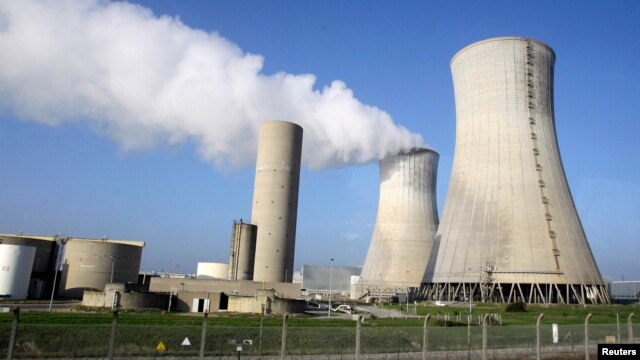
General view of the Areva nuclear power plant site in Tricastin, southern France, Nov. 25, 2011.
PARIS — French authorities arrested more than two-dozen Greenpeace activists Monday, after they broke into a nuclear-power plant in southern France to highlight security and environmental concerns surrounding nuclear-power production.
It reportedly took only 20 minutes for Greenpeace activists to break into the Tricastin nuclear-power plant, roughly 120 kilometers from the southern French city of Marseille.
Greenpeace France posted a video of the plant on its website, with a picture of French President Francois Hollande and a question: "President of catastrophe?"
Greenpeace spokeswoman Isabelle Philippe said the group wants to feed a debate over nuclear energy and push Hollande to make good on promises to reduce nuclear's share of France's electricity generation from 75 percent to 50 percent by 2025.
The Greenpeace action aims to highlight what the group claims are the environmental and human risks posed by the 30-year-old Tricastin plant, which it says is one the five most dangerous in France. But France's nuclear safety agency did not include it on a 2012 list of plants with the lowest safety records.
The power company, Electricite de France (EDF), said the Greenpeace intruders were almost immediately detected and had not penetrated into sensitive parts of the site.
Speaking to reporters, an EDF spokesman said the company was going to file a complaint against the break-in and work to toughen penalties against those who try to stage similar actions.
But the action won support from Jean-Vincent Place, a leading member of France's Green Party, which is part of France's coalition government.
Interviewed on Europe-1 radio, Place said the break-in underscored the fact French nuclear power posed a security risk.
With almost 60 nuclear plants on its territory, France is a leading generator and exporter of nuclear power and technology. Greenpeace has broken into nearly a dozen plants over the years.
In 2011, it penetrated another aging plant, again to underscore the vulnerability of nuclear power - despite promises by France and other European countries to upgrade their reactors after the Fukushima disaster in Japan.
France is expected to close yet another aging and controversial plant by the end of 2016. |
|
